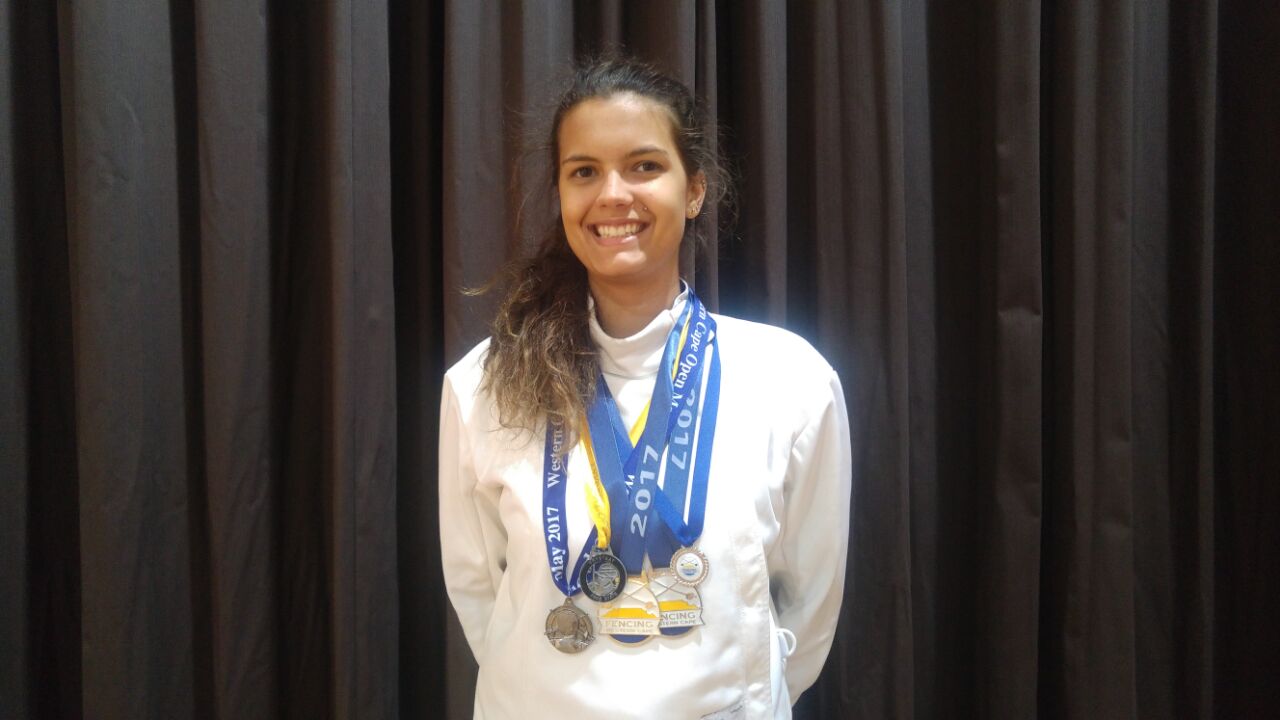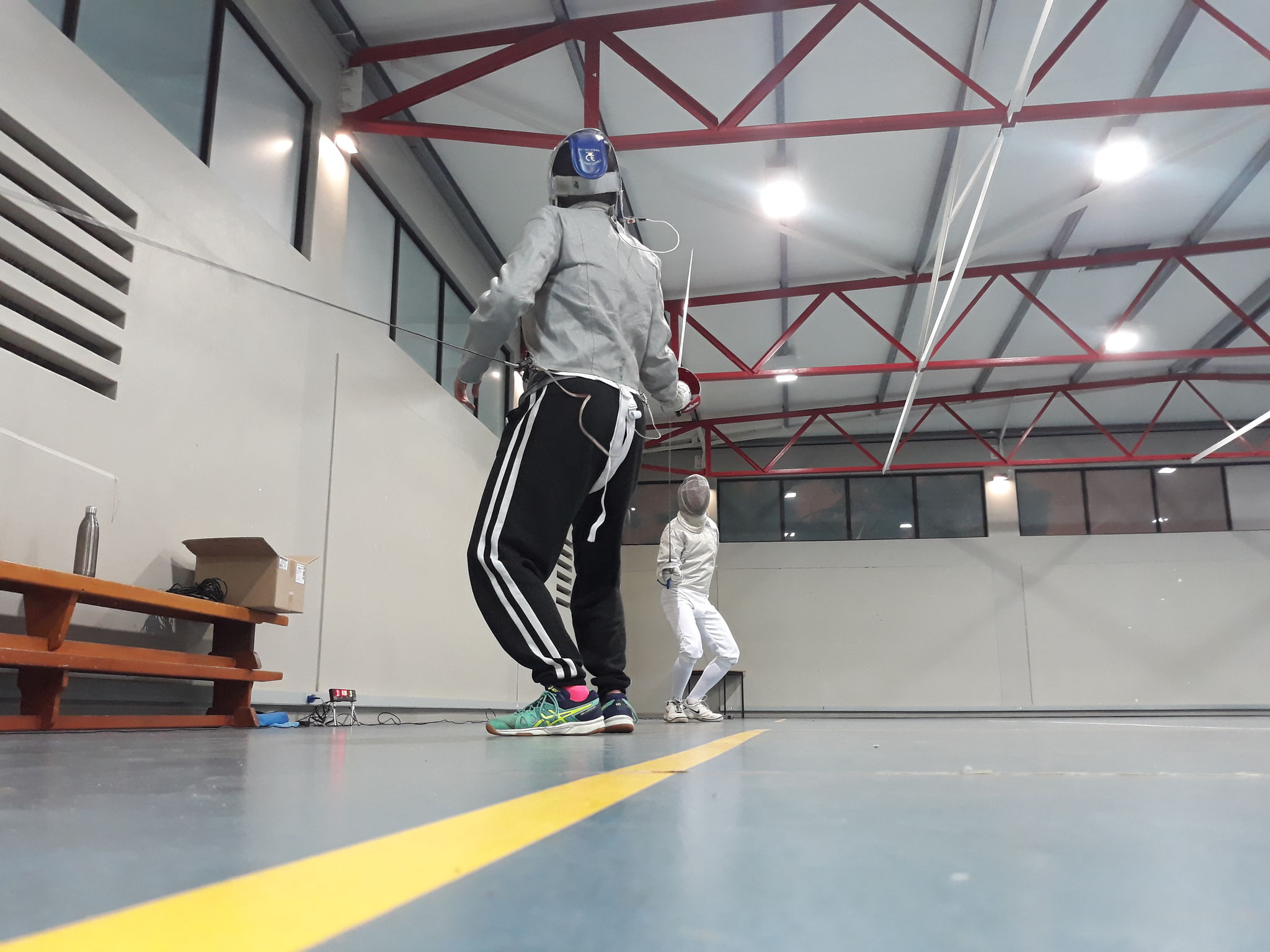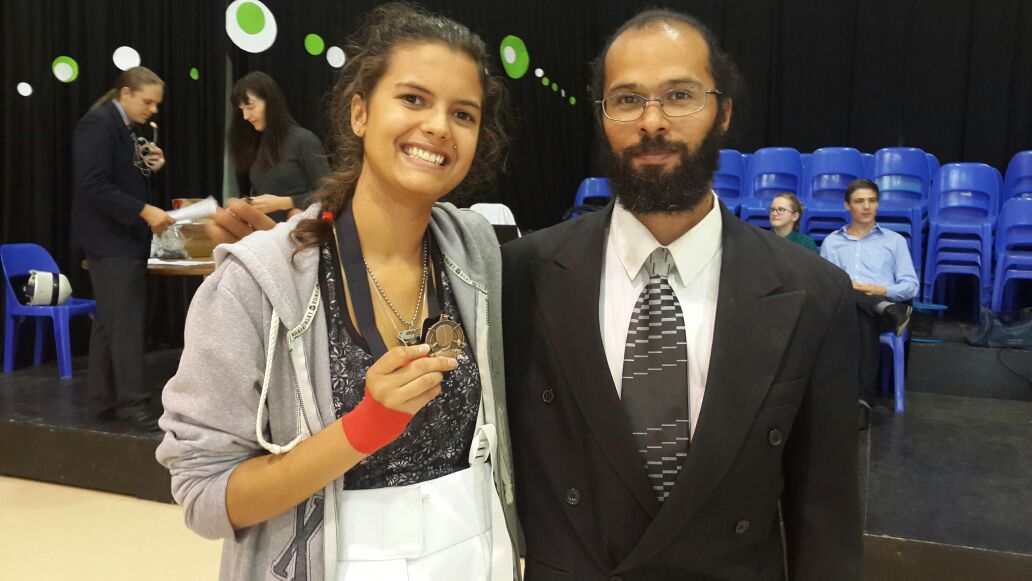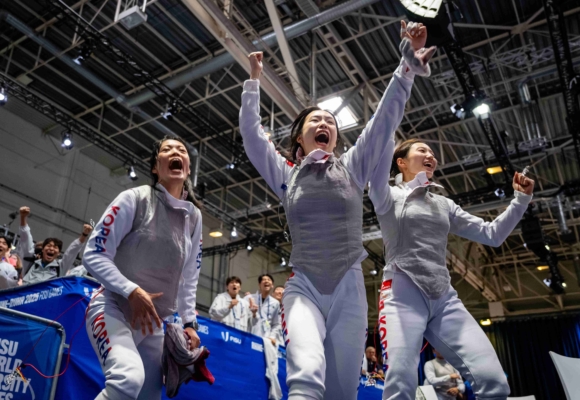 South Africa’s University of Stellenbosch fencer Akira Coetzee“What is fencing?” That, South Africa’s University of Stellenbosch fencer Akira Coetzee says, is the predominant question she receives when her sporting passion is brought up in conversation. While the historic medieval sport enjoys popularity across Europe and Asia, its existence is largely unknown in the southern tip of Africa where football, rugby and cricket are the more traditional recreational activities. At university level, fencing remains a niched activity with a minor following in the country, yet the sport’s embers are still glowing thanks to the contribution, sacrifice and achievements of a committed few.
South Africa’s University of Stellenbosch fencer Akira Coetzee“What is fencing?” That, South Africa’s University of Stellenbosch fencer Akira Coetzee says, is the predominant question she receives when her sporting passion is brought up in conversation. While the historic medieval sport enjoys popularity across Europe and Asia, its existence is largely unknown in the southern tip of Africa where football, rugby and cricket are the more traditional recreational activities. At university level, fencing remains a niched activity with a minor following in the country, yet the sport’s embers are still glowing thanks to the contribution, sacrifice and achievements of a committed few.
Coetzee, a member of the University of Stellenbosch Fencing Club since 2019 and the club’s captain, is one of the afore-mentioned dedicated fencers keeping the sport going. Initially an avid swimmer and volleyball player, she was introduced to the sport at age 11 by a friend, simply to make up numbers in her school’s team.
“My school provided fencing as an extracurricular sport and one year my friend asked if I wanted to fence because they needed more people to join,” she tells FISU. “That’s where I met my then – and current – coach Marius Titus. I started fencing when I was 11 and I fenced for a year until the club had to close due to a lack of fencers. I stopped fencing until I was 16 when I bumped into my coach on a hike and decided to start fencing again. I’ve been fencing ever since.”
She was fortunately able to continue her passion into her tertiary education studies, joining the Maties (as the University of Stellenbosch is affectionately known) Fencing Club which, according to club chairperson Dirk Slabber, originated during the 1990s, and averages around 40 members per year.
“Each year, we are lucky enough that we get roughly the same number of new fencers as those graduating university and leaving Stellenbosch,” Slabber says.
Twenty-three-year-old Coetzee, fresh off graduating from a bachelor’s degree in Language and Cultures and currently studying towards an Honours degree in Ancient Cultures, chuckles at the various experiences she’s had in explaining what fencing is to the many bewildered students who have never encountered the sport.
“I often have to explain fencing as ‘what James Bond with the sword in Die Another Day’ or ‘sort of like Zorro, but more structured’,” she laughs. “But the biggest misconception that people have about fencing is that it utilises one weapon when in fact there are three completely different weapon categories with their own rules and kits.”
South Africa has only enjoyed representatives in the fencing competitions at just five editions of the Olympic Games, the last being at the 2008 Games in Beijing, despite the origins of the sport in the country dating back to 1898, according to the Fencing Federation of South Africa (FFSA)’s archives.
FFSA organises just two tournaments a year, while clubs – like the University of Stellenbosch – have to organise friendly inter-club competitions to maintain a respectable level of competition, while there is only one annual nationwide university fencing competition in the University Sports South Africa programme.
Very few universities in the country offer fencing as an extra-curricular activity, and while many students have joined the Maties Fencing Club “for the excellent stress relief and camaraderie found in this tightly knit community”, according to Slabber, Coetzee’s previous experience has seen her qualify for the South African national team, but has been unable to take her talent to the next level due to a lack of resources.
“Fencing is a very small sport indeed, and most of the fencers who frequent the national tournaments all know each other,” she says. “I’ve been fencing in national tournaments since 2016, and have qualified twice to compete in the Senior African Games and once for World Championships, but have not been able to go to these due to financial issues and lack of correct level of fencing kit.”
Despite this, Coetzee remains motivated and extremely passionate about the sport she has been actively practising for the past half-decade.
“Fencing has always been more than just a physical sport for me,” she says. “I find that fencing is extremely technical, and I love that about it. You are required to be both quick on your feet and able to make split-second decisions. I’m extremely competitive so team sports were always a bit of a struggle for me but with fencing, I can push myself knowing that it’s only me that can get things done. This competitiveness is definitely my biggest motivation. I like to win so I always keep pushing myself to try being better, even if it’s hard.”
The dedicated fencer is a firm believer in a dual career, balancing her demanding academic workload with her sports training, which simultaneously acts as a much-needed stress-reliever. Akira Coetzee and her coach Marius Titus
Akira Coetzee and her coach Marius Titus
“I’ve found that balance is so important in functioning as a human being,” she says. “If I were just studying all the time, the competitive energy and need to win would drive me – and my family – insane. Having fencing, or any sport really, just to release the tension and to get that energy out is much healthier. You simply can’t study all the time and taking breaks by being active benefits your mental well-being far more than you would think. I’m always THAT friend who advocates active study breaks because I really believe they make such a big difference.”
Being a smaller club with limited backing, the Maties Fencing Club took a major hit following a tumultuous Coronavirus-hit 2020, yet club chairman Slabber is keeping a positive outlook for the future.
“Like many other institutions, the 2020 pandemic has greatly affected the club,” he says. “In a sense, we lost a year’s worth of training, income and, most importantly, new fencers. Now we are working hard with new regulations to ensure that our athletes can come to practice and do so safely. In the long term, we are always looking for ways to grow the club, encourage new fencers and support those that want to compete.”
For Coetzee, the COVID-enforced shutdown taught her more about time management and spreading out her workload with physical activity and personal downtime.
“As an athlete, Coronavirus destroyed the competitive year of 2020 and we were, obviously, not allowed to fence at all,” she says. “But the biggest lesson I learnt in 2020 was balance. Having the opportunity to work all day at home was something I started doing, but I quickly found that putting in 10 hours of work every day just to finish faster was far too draining on my mental health. So, I made a proper study-exercise regime that also allowed for free time to rest. Now, if I need to miss fencing because of my workload, I know that it’s alright and I can always do 30 minutes of fencing drills at home.”
An astute student, Coetzee hopes to remain in academics for a little while yet while also harbouring hopes of teaching abroad but admits the sport she has grown so fond of, despite its diminutive stature in the country, will always be a part of her.
“I love what I am studying now and I would love to continue to do my Masters and PhD as well,” she reveals. “I think I’d love to give back and inspire students just as I was inspired by my own lecturers, so perhaps lecturing might be in the future. Otherwise, I’d love to teach abroad, Japan would be the biggest goal for me. I love fencing and I think I will always be fencing because I have my fencing family, my coach and all the people I’ve met through fencing. Where fencing might take me in the future is something I am unsure about.”
PHOTOS COURTESY OF Akira Coetzee



